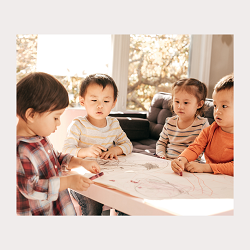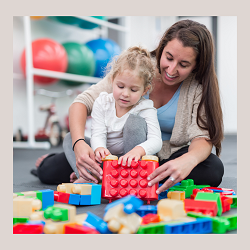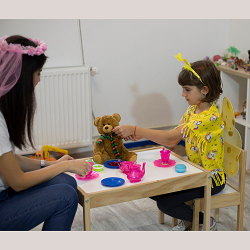It all started when she decided she didn’t want to wear her pants.
She struggled, wriggled, and managed to get them to her ankles.
You intervened, pulled them up…she got mad.
Down they came, you got mad.
People walking the aisle give you a wide berth.
You would too. After all, amongst the groceries, the cart you’re pushing seems to contain a tiny two-year-old demon. With the lungs of a lion.
You’re no match for her right now. So, you’re trying something new: pretending to ignore the tiny tenacious pant-less person who’s still shrieking.
You scan the shelves for marinara.
“Is this normal?” you wonder, “how do I know if this is normal?”
Renowned American Psychologist, Louise Bates Ames who specialized in childhood development spent much of her career in this field. Her work is still relevant and referenced today. Her books highlight what to expect at each stage of development, from ages one through fourteen.
Here’s a quick snapshot of her work, showing some common behaviors at each age, as well as what to look out for.
1. Your One-Year-Old “Fun-Loving and Fussy”
This is a time of incredible growth and firsts. You witness your child smile, become more present and aware, begin to crawl, and then pull themselves up and start to walk. They become vocal as well, learning how to assert the word “no.”
What to look out for:
-
Does not use or seem to understand body language or facial expressions, such as waving, smiling.
2. Your Two-Year-Old “Terrible or Tender”
This is a time of big emotions, tantrums, feelings in general. Your little one wants to become more independent, “me” and “mine” are usually their favorite words.
What to look out for:
-
Frequent tantrums
-
Repeatedly hits, kicks, bites or otherwise attempts to injure a caregiver, peer, or themselves.
3. Your Three-Year-Old “Friend or Enemy”
Sometimes anxious to please, other times strong-willed and defiant. According to Dr. Ames, negative behaviors are usually related to emotional insecurity.
What to look out for:
-
Tantrums that are much larger than the situation calls for
-
Extreme clinginess
-
Has trouble playing pretend
4. Your Four-Year-Old “Wild and Wonderful”
At this age, your child continues exploring and increasing their independence. In preschool, they are eager to please, and strive like their friends. It is still normal for them to be defiant at times.
What to look out for:
-
They keep getting in trouble
-
Bully’s or hurts their peers
-
Doesn’t listen
-
Exhibits behavior that could put them in danger
5. Your Five-Year-Old “Sunny and Serene”
At this stage, your child should have a grasp on basic emotions, but may have trouble and require assistance in identifying others, such as jealousy or frustration. They should be able to dress themselves and do other activities on their own, such as brush their teeth. Their outbursts should subside significantly.
What to look out for:
-
Disruptive behavior
-
Not taking responsibility or blaming others for their actions
6. Your Six-Year-Old “Loving and Defiant”
By age six, your child is growing more independent, pulling away from their primary caregiver. They may want to prove how “big” they are, and are discovering how to share and wait their turn. They are learning how to read, and are able to focus on a task for a longer period of time.
What to look out for:
-
Excessive lying, cheating or stealing
-
Back talk
-
Doesn’t follow directions
7. Your Seven-Year-Old “Life in a Minor Key”
At seven, your child becomes more withdrawn and introspective. They worry that no one likes them, they cry easily, and sometimes have a difficult time starting a task they don’t want to do. They may still have some challenges with self-control.
What to look out for:
-
Becoming too withdrawn and disengaged
8. Your Eight-Year-Old “Lively and Outgoing”
Your eight-year-old is exuberant and outgoing. They are excited to meet new challenges head on. They’re more analytical and find find fault in themselves and others.
What to look out for:
-
Disobedience
-
Disregarding safety
9. Your nine-year-old “Thoughtful and Mysterious”
Your child is on the verge of adolescence, and may continue to withdraw somewhat, spending more time with friends. At this age, some are boisterous and wild, and some withdrawn.
What to look out for:
-
Generally obnoxious behavior
-
Defiance
10. Your 10 to 14-Year-Old
A turbulent and uncomfortable time, for your child and perhaps you as well. During this stage your child is rapidly developing which may lead to being confused and all over the place emotionally.
What to look out for:
-
Destructive behavior
-
Anxiety, depression and other signs of psychological or emotional struggles
If your child seems to be a bit behind developmentally, or you’re worried they may be experiencing challenges and could use a little help, therapy may be the solution.
At the Relationship Therapy Center, our therapist’s meet children where they are, and gently teach them better ways to cope, engage with others, express emotion, and find appropriate ways to meet their needs.
Children are all unique, and some less than exemplary behavior or a slight delay in development isn’t always reason for concern. Our therapists will be able to help you decide if therapy is appropriate. Call our office, we are happy to answer questions and hear your concerns.
Remember, the earlier the intervention, the sooner your child will learn new skills and positive behaviors, making life more enjoyable for everyone.
Begin Play Therapy or Child Counseling in Roseville or Fair Oaks, CA today!
If your child is struggling, one of the best things you can do is be proactive in getting your child help from a trained play therapist. With help and support your child can overcome the things that are troubling them and move forward in their life with more confidence and peace. Our counseling practice offers specialized play therapy and child counseling services by play therapists at both of our locations. Your child, and your family, can get to a better place. Our child therapists are here to help.
To begin counseling in Fair Oaks, CA, Roseville, CA or online, follow these steps:
-
1. Contact the Relationship Therapy Center and schedule a free 20-minute phone consultation to learn more about in-person or online teen therapy
-
2. Make an appointment for your teen to meet with one of our compassionate child therapists
-
3. Get the support your teen needs to navigate adolescent challenges with confidence!
Other Counseling Services at The Relationship Therapy Center in California:
In addition to teen therapy, Our Sacramento area counseling clinics located in Roseville and Fair Oaks, CA are pleased to offer a variety of mental health services. Our couples services include: Couples Counseling, Counseling after infidelity, sex therapy, co-parent counseling, family therapy, divorce counseling, intensive couples retreats, and premarital counseling. Our individual therapy services include anxiety treatment, therapy for children, teen therapy, depression treatment, codependency counseling and individual relationship counseling. Our therapists offer online counseling in California to treat a variety of mental health concerns. Please reach out to our Sacramento area therapy office to learn more about the many ways we can help you or your loved ones.



